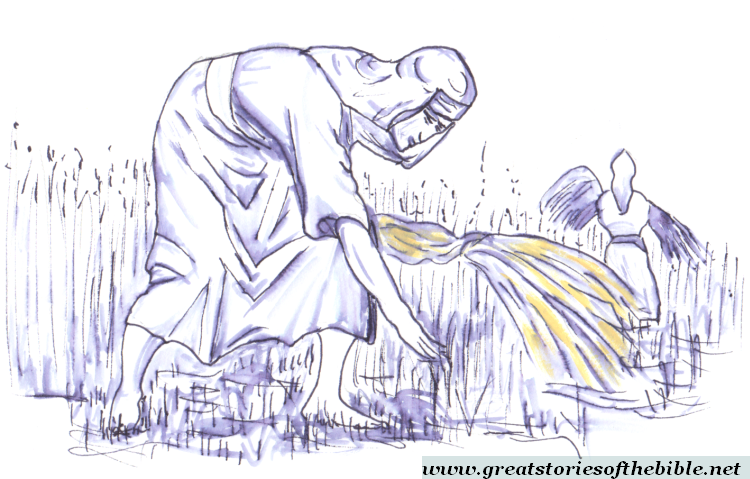Ruth
Your God shall be my God
We continue with the story of the four women cited in Jesus’ genealogy by Evangelist Matthew: in this post we speak of Ruth, the Moabitess. Her story is written in the biblical book called by her name, in four short chapters. We are «in the days when the judges judged», namely after Joshua’s death, a very troubled period in Israel’s history. The people is by now installed in the promised land, but because of their rebellions against the LORD have to fight against lots of enemies: «When the LORD raised them up judges, then the LORD was with the judge, and saved them out of the hand of their enemies all the days of the judge: for it grieved the LORD because of their groaning by reason of those who oppressed them and troubled them. But it happened, when the judge was dead, that they turned back, and dealt more corruptly than their fathers, in following other gods to serve them, and to bow down to them; they did not cease from their doings, nor from their stubborn way» (Judg 2,18-19).
Elimelech from Bethlehem, with his wife Naomi and his two sons Mahlon and Chilion, decides to emigrate to the country of Moab, because of a famine in Israel. The choice of Moab is not taken lightly: Israelites and Moabites have been enemies since the time of the entrance into the promised land: «An Ammonite or a Moabite shall not enter into the assembly of the LORD; even to the tenth generation shall none belonging to them enter into the assembly of the LORD forever: because they did not meet you with bread and with water in the way, when you came forth out of Egypt, and because they hired against you Balaam the son of Beor from Pethor of Mesopotamia, to curse you» (Deut 23,3-4). Elimelech dies shortly after his moving to Moab; his sons marry women of the place and, ten years later, die too. Naomi stays on, with her Moabite daughters-in-law Orpa and Ruth.
The famine in Israel finally ends and Naomi decides to go back in her country; her daughters-in-law want to follow her and Naomi three times tries to dissuade them. Only Ruth eventually maintains the decision to remain with Naomi, without returning to «to her people, and to her god», and she does it with a touching profession of faith: «Do not urge me to leave you, and to return from following after you, for where you go, I will go; and where you stay, I will stay; your people shall be my people, and your God my God; where you die, will I die, and there will I be buried. The LORD do so to me, and more also, if anything but death part you and me».
Ruth, as was right for the poor and the foreigner, went into the fields to glean for food to eat and finds herself in the field of Boaz, a wealthy landowner relative of Elimelech her father-in-law.

Boaz immediately notices the young foreigner. He asks her to stay in his fields, and not to go into those of others who do not know her and might harass her. He allows her to take home extra barley. Asked the reason for such favour Boaz answers: «It has fully been shown to me, all that you have done to your mother-in-law since the death of your husband; and how you have left your father and your mother, and the land of your birth, and have come to a people that you didn’t know before. May the LORD repay your work, and a full reward be given you from the LORD, the God of Israel, under whose wings you have come to take refuge».
Naomi thanks the LORD for the interest shown her by Boaz and thinks about convincing him to redeem her, as a close relative of her dead husband that left her without children (do you remember the law of the levirate marriage that we have already found in the story of Tamar?). Boaz, who fell in love with the young Moabitess and knowing her manifest honesty («all the city of my people does know that you are a worthy woman»), redeems Ruth and marries her. In the greetings that the elders present to Boaz returns our old friend Tamar, another probably foreign woman that, thanks to her righteusness, brought new life to the people of Israel: «Let your house be like the house of Perez, whom Tamar bore to Judah, of the seed which the LORD shall give you of this young woman» (Ruth 4,12). Indeed this is the case: Boaz will be the great-grandfather of king David in person («Boaz became the father of Obed, and Obed became the father of Jesse, and Jesse became the father of David»).
The Providence of the LORD is really marvellous: to his unfaithful people, in the time of the judges, points out the example of a Moabitess, formally an enemy, who overcomes a very bad situation of poverty and death (father-in-law, husband and brother in law) with her great faith in Him and becomes the ancestor of the greatest king of Israel.
In the next posts we will be writing about the last of the four women in Jesus’ genealogy: Bathsheba, wife of Uriah.
In the next posts we will be writing about the last of the four women in Jesus’ genealogy: Bathsheba, wife of Uriah.